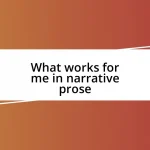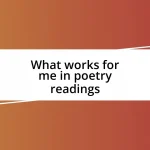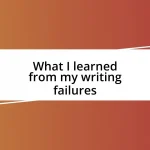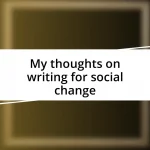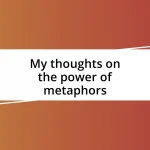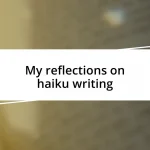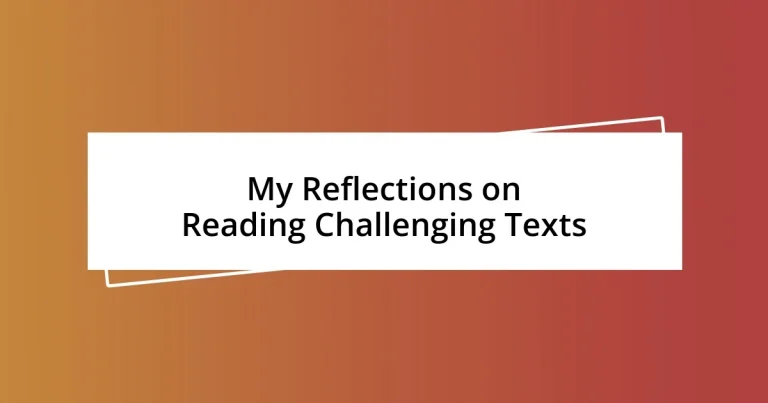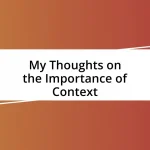Key takeaways:
- Reading challenges personal growth by expanding knowledge, enhancing empathy, and providing emotional insights through character experiences.
- Identifying challenging texts involves recognizing complex vocabulary, unconventional structures, abstract themes, dense information, and emotional weight.
- Active engagement strategies, such as breaking texts into sections, discussing with others, and taking notes, significantly improve comprehension and connection to the material.
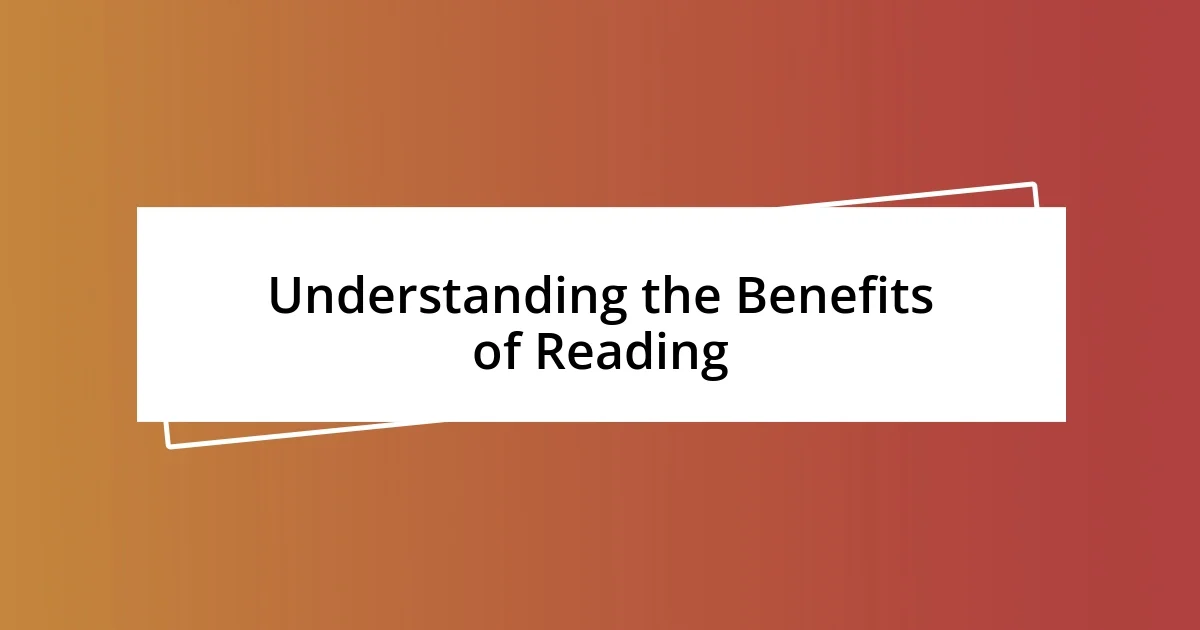
Understanding the Benefits of Reading
Reading is more than just a way to pass the time; it’s a gateway to understanding ourselves and the world around us. I recall curling up with a complex novel that challenged my thinking, and I found myself discovering parts of my personality that I hadn’t considered before. Isn’t it fascinating how a story can reflect our own struggles and aspirations?
One of the undeniable benefits of reading is the expansion of knowledge. When I dive into a challenging text, I often feel like I’m adventuring through uncharted territory. Do you remember that electrifying moment when a passage clicked, revealing a profound truth or idea? It’s moments like that that enrich our mental landscape, fostering a deeper understanding of diverse perspectives.
Moreover, reading has this remarkable ability to improve our emotional intelligence. I’ve noticed that by immersing myself in the characters’ journeys, I can relate to their feelings in ways that enhance my empathy. Have you ever experienced a shift in how you relate to others after reading about their struggles? That’s one of the true gifts of engaging with complex texts; they mold our ability to connect with the emotions of those around us, making life feel a little more shared and understood.
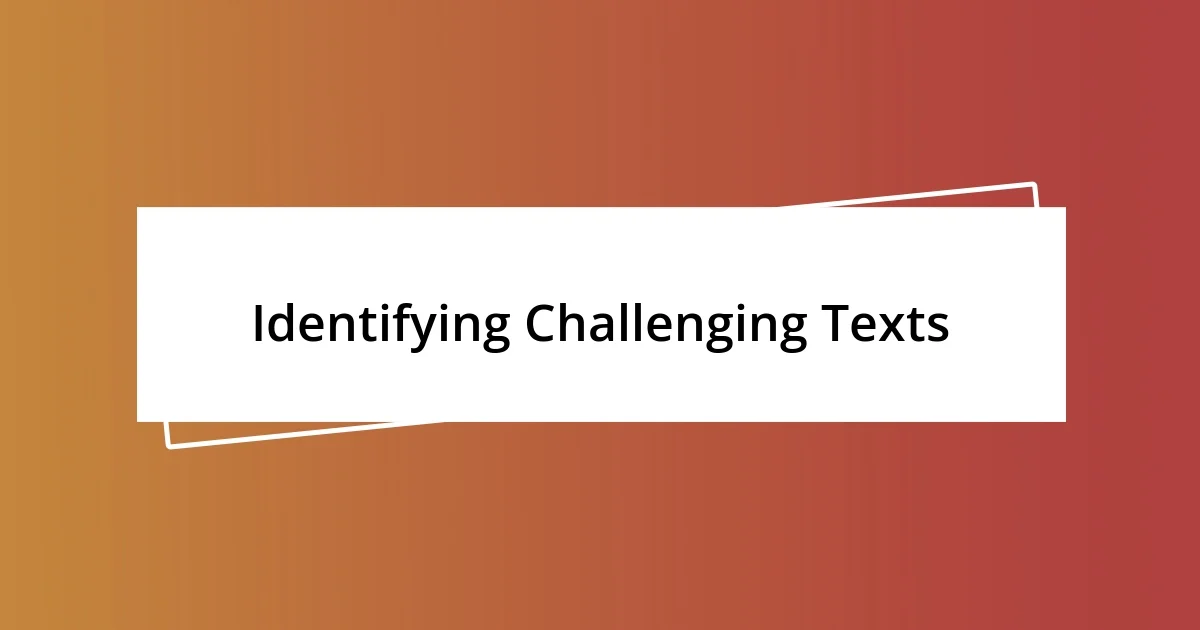
Identifying Challenging Texts
Identifying challenging texts can initially seem daunting. However, I’ve found that it often comes down to a mix of language, structure, and themes. For instance, I remember picking up a dense philosophical book that left me scratching my head at first. Yet, embracing the challenge allowed me to uncover profound ideas that resonated deep within me.
Here are some key characteristics to consider when identifying challenging texts:
– Complex Vocabulary: Look for texts filled with advanced or uncommon words that may require a dictionary.
– Unconventional Structure: Be aware of works that play with narrative styles, like nonlinear timelines, as they can be tricky to follow.
– Abstract Themes: Texts addressing deep or abstract concepts might require more contemplation and critical thinking.
– Dense Information Loads: Books packed with intricate information can feel overwhelming, demanding a slower pace and deeper focus.
– Emotional Weight: Challenging texts often provoke strong emotions, inviting readers to navigate difficult feelings alongside the characters or themes.
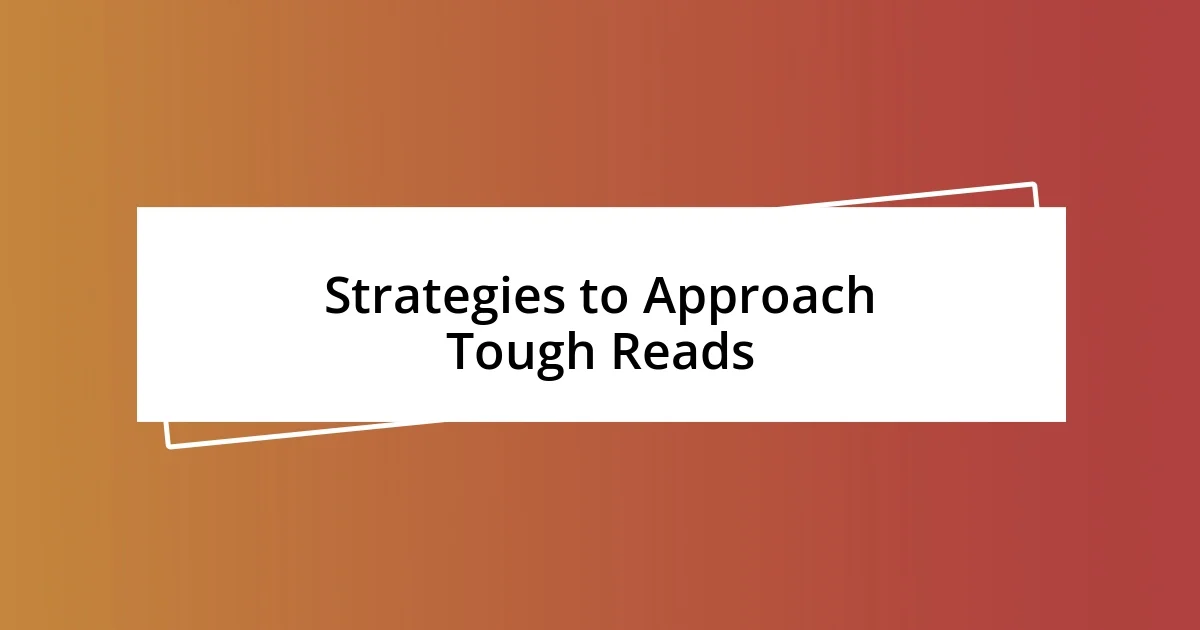
Strategies to Approach Tough Reads
When tackling tough reads, I find that breaking the text into manageable sections really helps. I often go through a challenging chapter, pausing to reflect on what I just read. This not only helps me grasp the content better but also allows me to take a moment to connect emotionally with the material. Have you ever noticed how a little breathing room can transform your understanding?
Another strategy I swear by involves discussing the text with others. I remember joining a book club where we dissected a particularly dense novel. Engaging with different perspectives illuminated aspects I had completely missed. It’s incredible how collective insights can open up new layers of meaning that you might not uncover reading alone. Have you ever had a conversation after reading that totally changed how you saw the book?
Lastly, I find that employing annotation can be a game changer. As I read, I jot down questions or pivotal thoughts in the margins. Revisiting these notes later guides me to pivotal moments or concepts. It’s almost like having a conversation with the author right there on the pages! How do you engage with the text when you feel it’s slipping away from your grasp?
| Strategy | Description |
|---|---|
| Break into Sections | Divide the text into smaller, manageable parts to enhance understanding and retention. |
| Engage in Discussion | Share insights with others to gain new perspectives and deepen comprehension. |
| Annotation | Make notes in the margins to capture thoughts and questions for later review. |
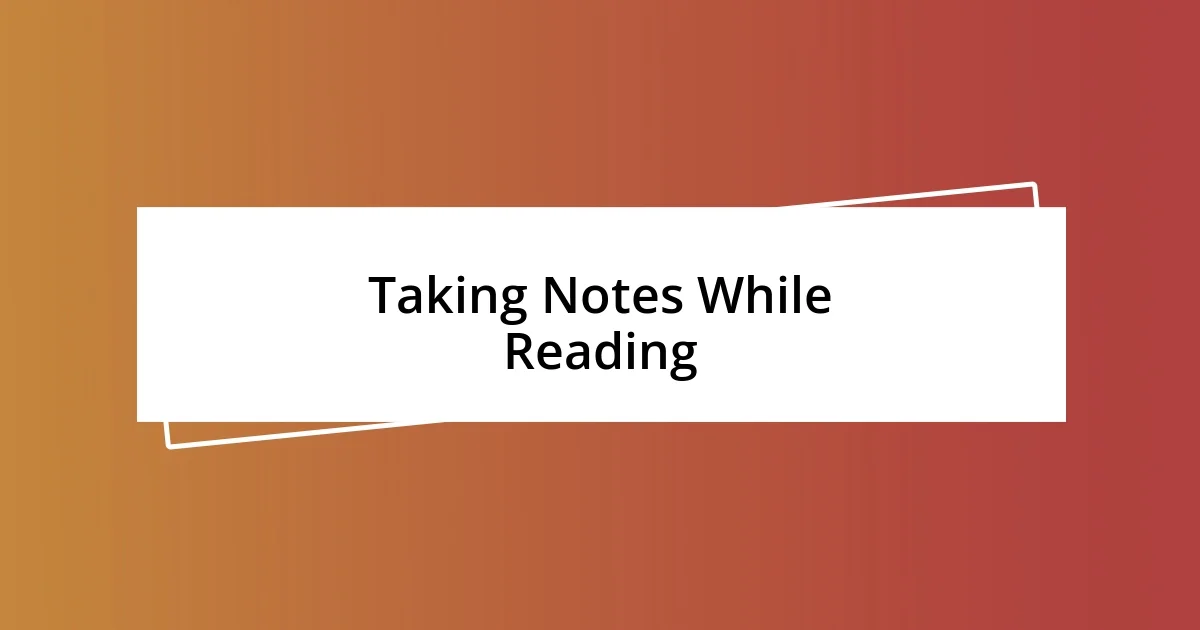
Taking Notes While Reading
Taking notes while reading can completely transform my engagement with a text. For instance, when I tackle a complex novel, I find myself scribbling down quotes that resonate with me or questions that arise in the margins. This practice not only keeps me focused but also makes the reading experience feel more interactive and conversational—like I’m in a dialogue with the author. Have you ever paused mid-sentence to jot down a thought that completely changed your perspective?
I remember a time when I was reading a challenging academic article. I created a mind map while I worked through it, connecting themes and important concepts. This method turned a potentially dry reading into a vibrant exploration. By visually linking ideas, I discovered relationships I hadn’t noticed before. Isn’t it fascinating how mapping out thoughts can illuminate connections you might easily overlook?
Sometimes, I also try to summarize sections in my own words. This approach really drives home the main ideas for me. I recall reading a dense historical text, and after each chapter, I would write a brief summary, capturing the essence. This habit not only reinforced what I learned but also provided a handy reference for later discussions. How do you keep track of what’s important in a text?
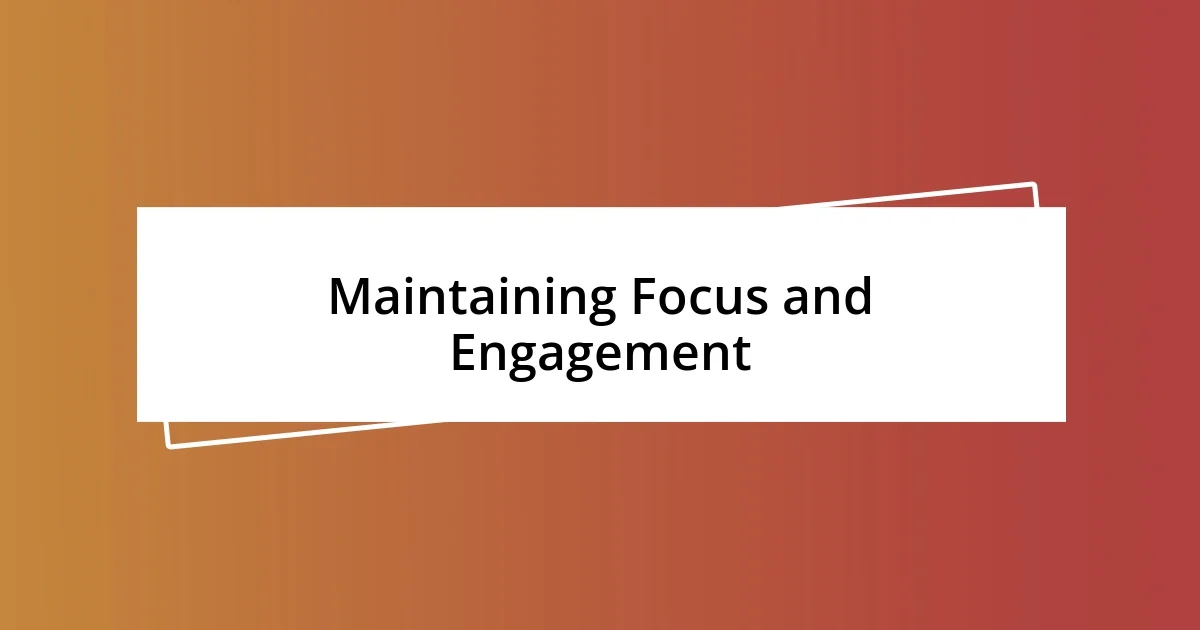
Maintaining Focus and Engagement
Maintaining focus while diving into challenging texts can sometimes feel like trying to catch smoke with your bare hands. One trick I find really effective is setting a timer for short reading bursts, like 20 minutes. This creates a sense of urgency that keeps my mind from wandering. Have you ever noticed how a ticking clock can sharpen your focus in a way nothing else can?
Another method that works wonders for me involves creating a designated reading nook—somewhere cozy, quiet, and free of distractions. When I settled into my favorite chair with a warm cup of tea, I found myself becoming enveloped in the material. The ambiance can truly transform how engaged I feel with what I’m reading. How do you create your ideal reading environment?
Lastly, a little self-care during breaks always revitalizes my focus. After a particularly intense reading session, I love to step outside, take a deep breath, and appreciate the world around me. This reset helps me reconnect with the text on a deeper level when I return. Have you ever experienced the rejuvenating power of a short walk after a bout of intense reading? It’s an incredible way to maintain not just focus, but also enthusiasm for the material.
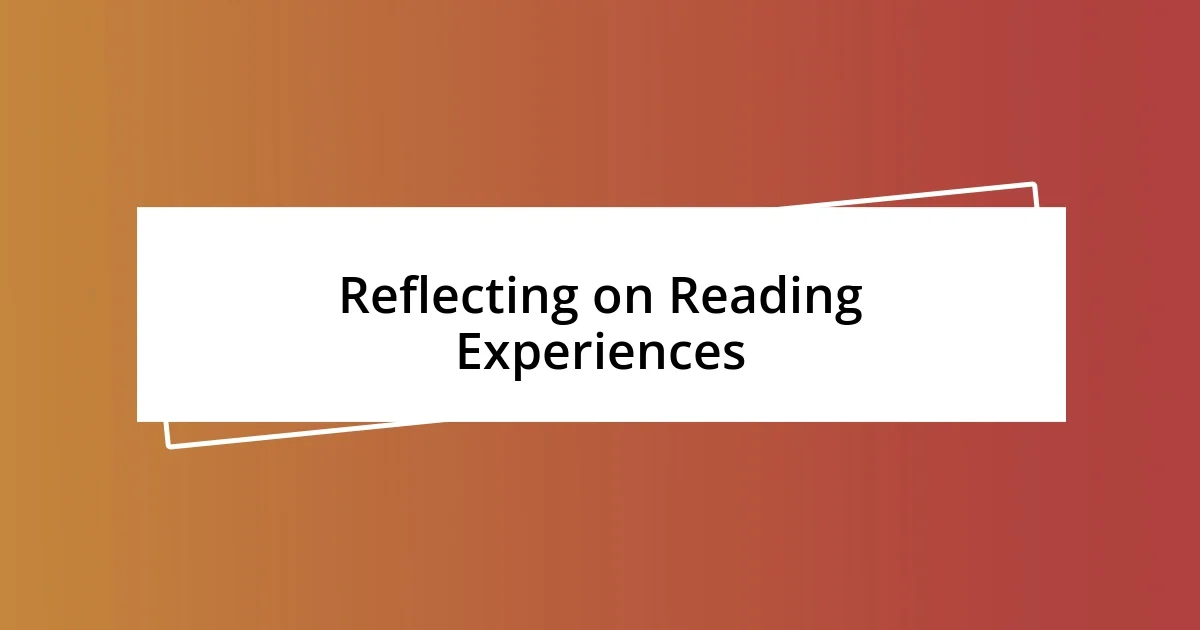
Reflecting on Reading Experiences
Reflecting on my reading experiences often reveals insights that transform how I view both the text and myself. For example, I once read a particularly dense philosophical work, and at first, it felt like swimming through molasses. However, taking the time to pause and write down my reactions created a dialogue within myself. It’s amazing how expressing my thoughts on paper allowed me to sift through confusion and discover hidden nuances in the arguments presented. Have you ever had a similar moment where writing sparked clarity?
I recall losing track of time while immersed in a science fiction novel that challenged my ideas of reality. During a break, I stepped outside and found myself pondering the themes while watching the clouds shift overhead. That simple act of connecting the text with my surroundings deepened my understanding. I realized how important it is to let reading experiences spill into daily life, making every page feel like a part of a larger narrative. Have you found moments where your reading intersects with everyday experiences?
Sometimes, reflecting on my initial emotional responses is equally enlightening. During my journey through a gripping memoir, I noticed waves of empathy wash over me. Writing about these feelings helped me dissect why the author’s story resonated so deeply. It’s intriguing how personal connections can enrich our understanding of complex texts. Have you ever been surprised by the emotional weight a book can carry? Engaging with these feelings often leads to revelations about our own lives and values.
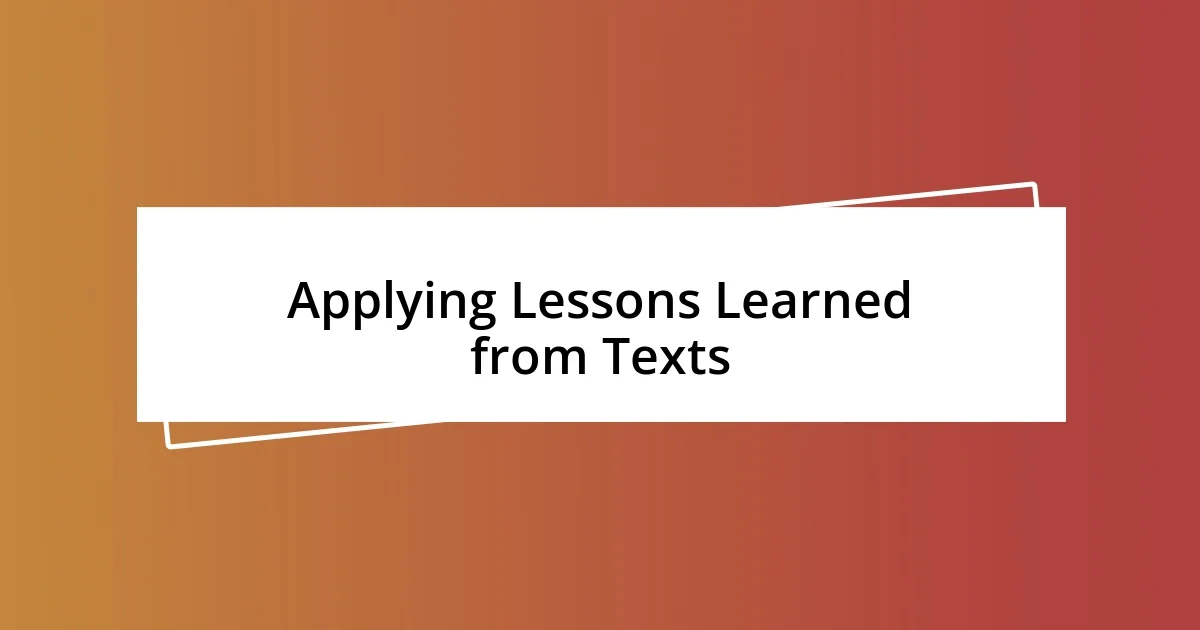
Applying Lessons Learned from Texts
Applying the lessons learned from challenging texts has profoundly shaped my perspective, both intellectually and personally. I remember tackling a dense biography that initially overwhelmed me. Yet, as I worked through it, I started jotting down key ideas and my reflections on them, which turned the experience into a treasure hunt for wisdom, rather than a chore. Have you ever found joy in unearthing life lessons from something that seemed daunting at first?
There have been moments when concepts from challenging readings have crept into my conversations or decisions. For example, after reading a powerful text on resilience, I made it a point to notice how I reacted to setbacks in my own life. That shift in mindset taught me to embrace challenges as opportunities for growth. It’s fascinating how a single idea can ripple through our everyday actions, isn’t it?
Sometimes, applying the lessons I’ve gleaned from texts triggers a deep emotional response that lingers long after the last page. I recall reflecting on a heartbreaking novel about loss, which led me to reach out to a friend going through a tough time. This connection, prompted by what I’d read, opened up conversations that brought us both comfort. Have you experienced a moment where a book pushed you to strengthen relationships or reconsider how you interact with those around you? It’s a beautiful reminder of the power literature holds in bridging gaps in our lives.

